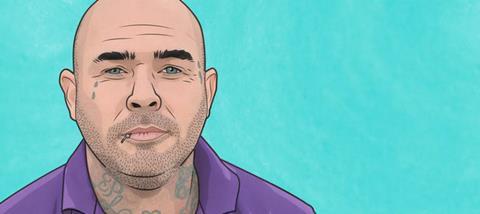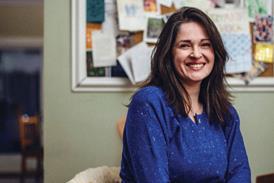
Growing up was pretty tough. I suffered a fair amount of physical abuse as a child so I became quite timid and shy. I didn’t mix with others very well. As I got into my teenage years, I was self-harming quite a lot. I started to self-harm my face because I had this deep-rooted belief I was not a good person, because I’d constantly received negative criticism. I grew to massively dislike myself as a person.
Drink and drugs
I’d always believed in God but that disappeared a bit when I got into my 20s. Because I had no identity of my own, I put myself into different groups of people – the popular people. I started taking drugs and drinking too much. At the time I put it down to that circle of friends and socialising, but it was to hide my feelings of what was happening inside.
I got a job as a builder’s labourer and was earning good money. I went through my 20s doing drugs and trying to bury everything. I wore a fake smile for years; no one questioned why I had cuts on my face.
I got married when I was 28. My wife became pregnant with my daughter. Everyone else around me knew my drink problem had got really bad. I was shrugging it off. By the time I was 31, I was drinking at work during the day and drinking at night.
I woke up one day and admitted I had a problem. The company who were employing me knew I had a problem. I was the last one to own up to it. They offered to put me through private counselling. That’s what I did – ten sessions of counselling. I never picked up a drink from the day I went in and that all went fine. But there was a whole new problem because I then had to face up to these feelings I had buried as a youngster.
I did well for quite some time. But a few years down the line my wife and I grew apart and that became difficult. I made a choice to leave home. The thought of missing my daughter each day was tough. But I did leave. I met someone else but that other person was doing the drug thing and I fell off the wagon again.
One Sunday I got in a van and drove; I had a knife, and was harming myself. The police spent all day trying to find me. I gave up and was sectioned and put in a mental health unit for four weeks. That’s where I needed to be. They put me on medication, which had never happened before.
I pulled through it and came out. From May 2011 onwards I’d have a breakdown and be sectioned again every few months. They call it reoccurring depressive disorder. I was going in and out of these mental health units.
Walking away
The big moment came when my mum passed away. I adored my mum so that was the worst experience ever. I was living on my own. I thought I was doing OK for a month or so. But then it just hit me.
I walked away from everything I had and that’s when I became homeless. I left absolutely everything. Work, my belongings – everything.
I ended up sleeping in a park in Epsom in a bush with a blanket. I did that for ten months – just living on the streets. I was regularly getting sectioned. I became suicidal. I hadn’t seen my daughter. None of my family had tried to find me.
I was in the Epsom mental health unit and managed to get to the shop and find a razor blade. I sat on the end of my dorm bed and cut through my main artery and effectively bled to death in the corridor. I had to be revived by a paramedic, rushed to St George’s Hospital. They repaired all the veins in my wrist in emergency surgery and I spent four days on suicide watch with mental health staff beside the bed.
The turning point
Every time the mental health units discharged me they’d send me to the council who said they couldn’t help me. But I ended up being transferred to a mental health unit in Camberley where they managed to find me a room at the YMCA in Surbiton. That was the turning point. Someone put some work in and found a roof over my head. All I wanted was a stepping stone.
I met Jackie Bone, the chaplain of the Surbiton New Life Baptist Church. I had conversations with her. They run a group at the YMCA called Life Journey where they talk about a subject then do the Christianity bit. They selected a group of residents to go down to Wales for a week. There’s a chapel there. And that’s where I found God.
I spent four days on suicide watch with mental health staff beside the bed
I was in the chapel alone and it dawned on me. My favourite story is ‘Footprints in the Sand’. It became apparent to me I wasn’t on my own. Somebody had been with me all the time. There was a reason I didn’t die and I was still here. That week in Wales I knew that somebody was with me. Even though I was on my own and I’m on my own now, I know God is with me. He’s walking with me side by side. Even though there’s no physical appearance or footprints in the sand, I know he’s there.
I would regularly go to church with Jackie on a Sunday and I was baptised. It changed me forever.
I've since been diagnosed with bipolar borderline personality disorder. A lot of people struggle with diagnosis, but for me it was another starting point. There have been times when I’ve been to hospital because my mental health has been low. I’ve survived it a lot easier knowing that when I wake up in the morning, I’m not on my own and God is beside me.
Even though I’ve been poorly and my head has not been great, every single day I know God is beside me. I’ve coped with that much better because I know I’m not on my own.
Paul Squires now volunteers with the Chaplaincy Team at YMCA London South West. He was speaking to Sam Hailes
Click here to request a free copy of Premier Christianity magazine




























